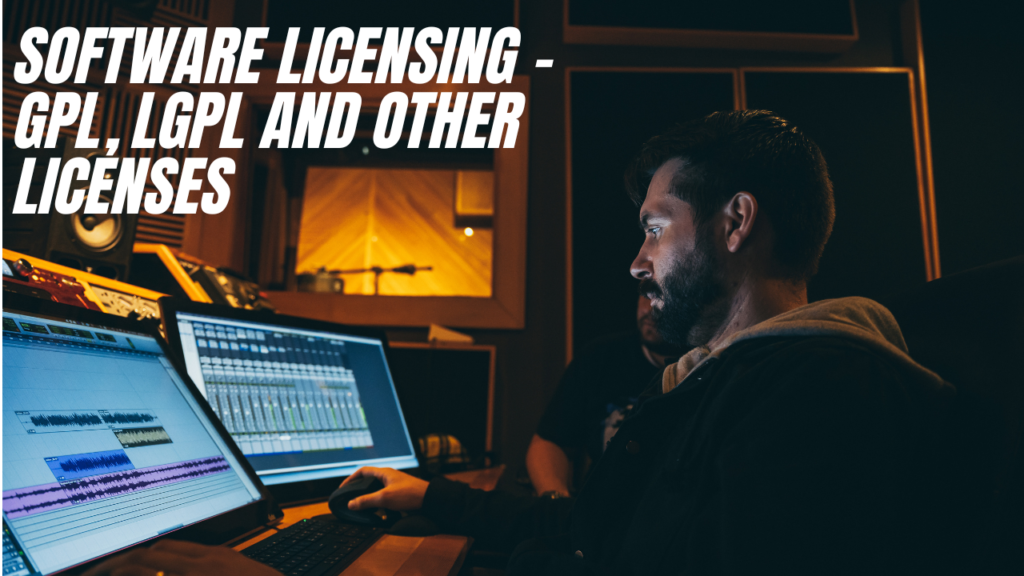Introduction
Software licensing governs the legal use, distribution, and modification of software. It is a crucial aspect that defines how software can be shared, what can be done with it, and the responsibilities of both developers and users.
Importance of Software Licensing
Software licensing is a foundation for collaboration, innovation, and protection in the software industry. Defining the terms under which software can be used safeguards the interests of developers and users alike.
Open Source Software
Understanding Open Source
Open-source software is a framework that encourages collaboration and transparency. Developers share their source code openly, allowing others to view, modify, and distribute it.
Benefits of Open Source
Open-source software promotes community-driven development, rapid iteration, and flexibility. It often leads to high-quality software that evolves based on user feedback.
GPL (GNU General Public License)
The GPL operates on the foundation of four fundamental freedoms: the freedom to use, study, share, and modify software. This is encapsulated in the copyleft principle, which mandates that any derivative work or distribution must also be licensed under the GPL. With different versions of the GPL, compatibility between them can be a complex matter.
Principles of GPL
The GPL license, introduced by the Free Software Foundation (FSF), enforces software freedom. It requires that any derivative works also be open source and freely available.
Copyleft Concept
GPL uses the copyleft concept, ensuring that modified versions of GPL-licensed software remain open source. This prevents anyone from turning open software into proprietary software.
Advantages and Concerns
GPL protects user freedoms and prevents vendor lock-in. However, its strict terms might discourage some commercial developers from using GPL-licensed code.
LGPL (GNU Lesser General Public License)
In contrast to the GPL’s strict copyleft approach, the LGPL offers more flexibility. It allows developers to use LGPL-licensed components in open-source and proprietary projects without forcing the entire project to adopt the LGPL. This makes LGPL a favourable choice when creating libraries that can be integrated into various software projects.
Key Differences from GPL
LGPL is a more permissive version of GPL. It allows software linked with LGPL-licensed libraries to be proprietary while the library remains open source.
Use Cases and Advantages
LGPL strikes a balance between openness and commercial use. It suits libraries and component developers who want to encourage broad adoption.
Comparing GPL and LGPL: Which One to Choose?
The choice between GPL and LGPL depends on the developer’s intentions and project goals. GPL ensures a strong commitment to open-source principles, while LGPL balances openness and proprietary use. Developers must consider the implications on user freedoms and the project’s long-term sustainability.
Permissive Licenses
M.I.T. License
The M.I.T. License allows users to use, modify, and distribute software with minimal restrictions. It is popular for its simplicity and permissiveness.
Apache License
The Apache License focuses on collaboration and contribution. It provides extensive permissions and includes provisions for patents.
BSD Licenses
BSD licenses offer flexibility and minimal restrictions. They come in two main variants: the 3-clause BSD and the more permissive 2-clause BSD.
Proprietary Licenses
Characteristics of Proprietary Licenses
Proprietary licenses restrict how software can be used, often for commercial purposes. They vary in terms of allowed usage, distribution, and modification.
End-User License Agreements (EULAs)
EULAs are standard proprietary licenses for commercial software. They outline the terms users agree to when installing or using the software.
Choosing the Right License
Considering Project Goals
Selecting a license should align with the project’s objectives. Open licenses encourage collaboration, while proprietary licenses offer more control.
Collaborative vs. Closed Development
For collaborative projects, open-source licenses foster community involvement. Closed projects may opt for proprietary licenses to protect intellectual property.
License Compatibility and Compliance
Compatibility Concerns
License compatibility is crucial when combining code from multiple projects. Incompatible licenses can lead to legal issues.
Ensuring Compliance
Compliance involves adhering to a license’s terms. Tools and guidelines help developers manage compliance and avoid legal disputes.
Risks and Liabilities
Breach of License Terms
Failing to comply with license terms can result in legal consequences. Proper understanding and adherence are essential.
Mitigating Legal Risks
Clear documentation, diligent tracking of code origins, and adherence to licensing terms help mitigate legal risks associated with software development.
Future of Software Licensing
Evolving Landscape
Software licensing continues to adapt as technology evolves. New licenses and changes to existing ones reflect the changing needs of developers and users.
Emerging Trends
Trends like the rise of permissive licenses, increased license compatibility efforts, and the influence of artificial intelligence are shaping the future of software licensing.
Conclusion
Software licensing is a cornerstone of the software development ecosystem. Understanding the variation of licenses like GPL, LGPL, permissive licenses, and proprietary licenses empowers developers to make informed choices that align with their project goals.
F.A.Q.s
- Can I use GPL-licensed code in my commercial application?
- No, GPL requires derivative works also to be open source.
- What is the key difference between GPL and LGPL?
- LGPL allows proprietary software to link with LGPL-licensed libraries.
- Are permissive licenses more business-friendly?
- Yes, permissive licenses offer greater flexibility for commercial use.
- Do proprietary licenses apply to all types of software?
- Yes, proprietary licenses can apply to any software where the developer wants to retain control over its use.
- Is compliance with software licenses legally binding?
- Yes, violating software licenses can result in legal consequences.


